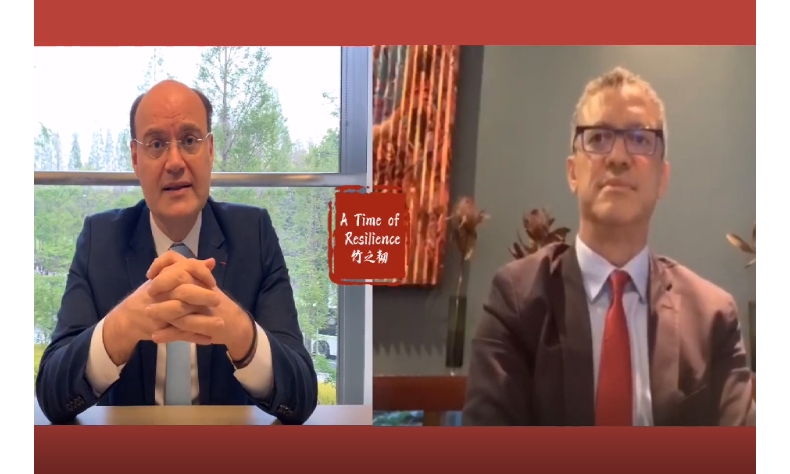
Vice President of NDB: The World Should Reinvigorate Multilateralism for the New Era
Multilateralism is so important. The opportunity, therefore in the current moment, is to reinvigorate multilateralism and to build a new platform for the new era.
Editor’s note: As the Covid-19 pandemic continues around the world, multilateralism faces the growing threat of protectionism and populism. Against the backdrop, David Gosset, the founder of Europe-China Forum, discusses with Leslie Maasdorp, Vice President of the New Developement Bank in the interview of A Time of Resilience.
David Gosset: Leslie, it seems also to me that the world is focusing very much on the articulation between China and the West, China and the United States of America. But we live in the world, which is multipolar. And I would like you to tell us more about the pandemic from an African perspective.
Leslie Maasdorp: Africa of course is a very large continent; it has 1.2 billion people. It has 54 countries. Africa has one advantage that the pandemic hit the shores of Africa only after it has spread throughout many parts of the world. Therefore, our governments and policy makers, our public health care and private health industry have been able to learn the lessons from the rest of the world. As you know, previous pandemics suggest that the poorest of the poor have always been the hardest hit. Therefore, Africa has to be very careful to contain this pandemic before it explodes. As you know, the continent has experienced significant social and economic progress over the last 20 years. We have today or certainly prior to the pandemic 6 out of the top 10 fastest-growing economies in the world. I’m indeed from Africa. So, we are around this real risk that a lot of the significant progress could be reversed if we do not deal with this in a decisive manner.
David Gosset: We know very well that the Bretton Woods System was a product to a certain extent of a major tragedy, the Second World War. Now we might have an opportunity to go to a kind of Bretton Woods 2.0. what do you think about this, Leslie?
Leslie Maasdorp: We often take for granted the role that multilateral institutions have played over the last 70 years, in the seven decades after the end of the Second World War. Many of these institutions, underpinned by the Bretton Woods foundations, lay the basis for long-term peace and prosperity. The danger now is to return to a more inward-looking approach towards protectionism, almost the Law of the Jungle with people only looking after their own national interest. So, in many respects, multilateralism is an antidote against protectionism. Multilateralism is so important. The opportunity, therefore in the current moment, is to reinvigorate multilateralism and to build a new platform for the new era. Because what the current pandemic has done is that it exposed the fragility of the current system in many of the institutions as they exist. So yes indeed, there are significant improvements required to make the institutions more effective.
David Gosset: We have used bamboo as a metaphor for resilience. So, we are inviting people to think about the nature of the bamboo.
Leslie Maasdorp: David, I agree fully with your metaphor about the bamboo. Bamboo does not only represent something durable and something strong, but it has also within it, elements of flexibility and elasticity if you like. The most outstanding quality of the bamboo really is the fact that its roots grow horizontally. So, its roots interconnect with other roots around it. And I would use those roots as a metaphor for what the global system really represents. We are all connected as a globe, as a human society. A number of values that underpins those essential foundations. So, what the bamboo represents really is that our ability, based on our reliance on those values, we will be able to withstand storms if those foundations are strong. In sum, the strength, the durability and the flexibility of the bamboo represent the essence of what a new global system ought to rely on, provided that it was built on those foundations of the interconnectedness of our society.
 Facebook
Facebook
 Twitter
Twitter
 Linkedin
Linkedin
 Google +
Google +










